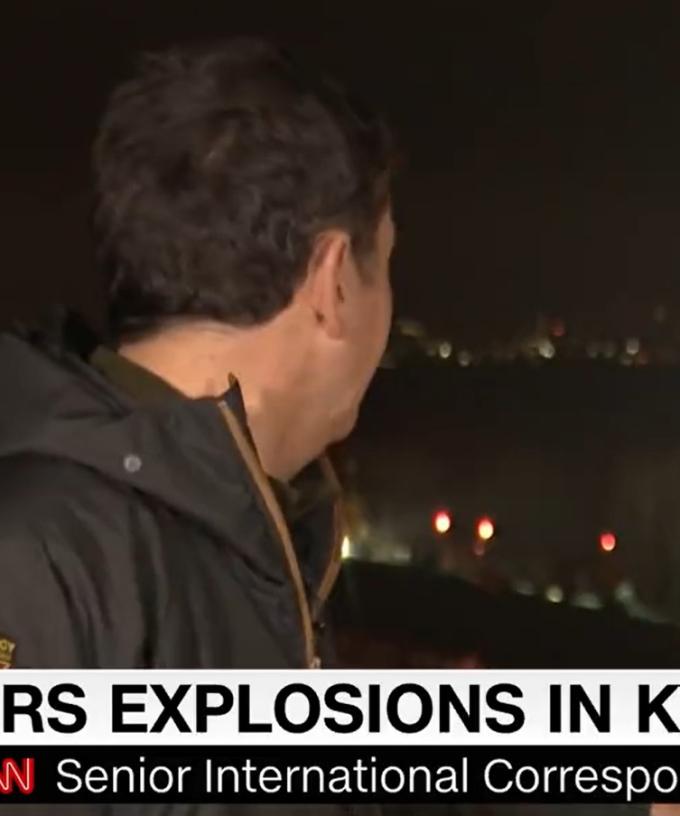Russian President Vladimir Putin has authorised a military operation in eastern Ukraine in what could be the start of war in Europe over Russia’s demands for an end to NATO’s eastward expansion.
Shortly after Putin spoke on Thursday, a Reuters witness heard the sound of what appeared to be explosions in the distance from the capital Kyiv.
Explosions also rocked the breakaway eastern Ukrainian city of Donetsk and civilian aircraft were warned away as the United States said a major attack by Russia on its neighbour was imminent.
CNN’s Matthew Chance in Kyiv: “I just heard a big bang right here behind me.” Here’s the video of the moment pic.twitter.com/prYeVlDvkn
— Brian Stelter (@brianstelter) February 24, 2022
Explosions all over https://t.co/rxrwtIZsGp
— Mike Brown (@1MikeBrown) February 24, 2022
Photo from a livestream pic.twitter.com/RtA0HCgfCE
— OdeToWar (@histry_on_speed) February 24, 2022
In comments reported by Russian media, Putin said he had authorised a special military operation in breakaway areas of eastern Ukraine and clashes between Russian and Ukrainian forces were only a matter of time.
Hours after pro-Russian separatists issued a plea to Moscow for help to stop alleged Ukrainian aggression – claims the US dismissed as Russian propaganda – Putin said he had ordered Russian forces to protect the people and demanded Ukrainian forces lay down their arms.
He repeated his position that NATO expansion to include Ukraine was unacceptable.
At the UN Security Council, the US said shortly before Putin’s announcement that an invasion was imminent.
“We are here tonight because we believe, along with Ukraine, that a full-scale, further invasion into Ukraine by Russia is imminent,” US Ambassador to the United Nations, Linda Thomas-Greenfield, told an emergency meeting.
“Tonight we’re seeing the Russians close airspace, move troops into Donbas, and move forces into combat-ready positions. This is a perilous moment.”
Ukraine restricted civilian flights in its airspace due to “potential hazard”, hours after a conflict zone monitor warned airlines should stop overflights over the risk of an unintended shoot-down or cyber attack.
An El Al flight from Tel Aviv to Toronto and a LOT Polish Airlines flight from Warsaw to Kyiv turned out of Ukraine’s airspace around the time a notice was issued, according to flight tracking website FlightRadar24.
Russia also partially closed its airspace in the Rostov flight information region to the east of its border with Ukraine “in order to provide safety” for civil aviation flights, according to its notice to airmen.
Convoys of military equipment including nine tanks were seen moving towards Donetsk earlier on Wednesday from the direction of the Russian border, a Reuters witness reported.
Shelling has intensified since Russian President Vladimir Putin this week recognised two separatist regions as independent and ordered the deployment of what he called peacekeepers, a move the West calls the start of an invasion.
The UN Security Council met to discuss the stand-off on Wednesday night, in the 15-member body’s second late night meeting on the crisis this week.
A total of 80 per cent of the Russian soldiers assembled are in a position to launch a full-scale invasion on Ukraine, a senior US defence official said.
Satellite imagery taken on Wednesday showed new deployments in western Russia, many of them within 15km of the border with Ukraine and less than 80km from the Ukrainian city of Kharkiv, a US company Maxar said.
The images showed field deployment, military convoys, artillery and armoured personnel carriers with support equipment and troops. The images could not be independently verified by Reuters.
A 30-day state of emergency in Ukraine restricting the freedom of movement of conscripted reservists, curbing the media and imposing personal document checks, according to a draft text, begins on Thursday.
The Ukrainian government has also announced compulsory military service for all men of fighting age.
While the West has held off the most stringent sanctions measures it could impose, the United States stepped up the pressure by imposing penalties on the firm building the Nord Stream 2 gas pipeline and its corporate officers.
Germany on Tuesday froze approvals for the pipeline, which has been built but was not yet in operation, amid concerns it could allow Moscow to weaponise energy supplies to Europe.
While both sides have said they are still open to diplomacy to resolve the crisis, Ukrainian President Volodymyr Zelenskiy said earlier Moscow had approved an offensive and not replied to an invitation for talks.
“Today I initiated a telephone conversation with the President of the Russian Federation. The result was silence,” he said.
Ukrainian government websites, which have experienced outages in recent weeks blamed by Kyiv on cyber attacks, were again offline on Wednesday. Ukraine’s parliament, cabinet and foreign ministry websites were affected.
Australians in need of consular assistance should call the Australian Government 24-hour Consular Emergency Centre on 1300 555 135 in Australia or +61 2 6261 3305 outside Australia.
AAP







